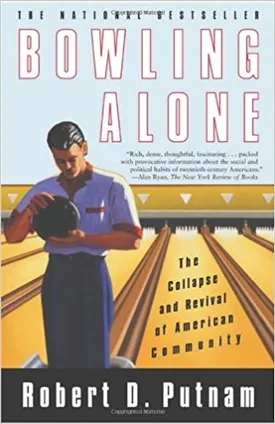Robert D. Putnam
Robert D. Putnam is an American political scientist and political theorist best known for his work on the impact of social capital on a range of topics from economic development to national political behavior. Putnam is the author of numerous books and articles, including Bowling Alone: The Collapse and Revival of American Community (2000). His other works include Making Democracy Work: Civic Traditions in Modern Italy (1993) and Our Kids: The American Dream in Crisis (2015).
Putnam was born in Rochester, New York in 1941. He attended Swarthmore College where he earned a B.A. in 1962. In 1963, he achieved an M.A. in political science from Balliol College, Oxford as a Rhodes Scholar. In 1965, Putnam completed his doctoral degree in political science at Harvard University.
Putnam began his academic career at Harvard, where he taught from 1965 to 1988. During these years, his research focused on international and national politics, later expanding to include areas such as civil society and social capital. He received numerous awards during this period, including the Karl Deutsch Award for Political Science in 1987 and the National Humanities Medal in 2012. In 1988, he left Harvard to become the Peter and Isabel Malkin professor of public policy at Harvard Kennedy School.
During the second half of his career, Putnam shifted his focus more to social science and social policy, attempting to bridge the gap between these fields and political science. He has argued for a renewed focus on civil society and social capital, calling for programs to strengthen involvement in non-governmental organizations and other voluntary associations. Much of his work has argued that vibrant communities depend upon their members engaging and connecting with each other, and that this type of participation is a major driving force behind democratic societies. This concept has become known in popular culture as “the big sort.”
In 2000, Putnam published Bowling Alone: The Collapse and Revival of American Community. This book is one of the most widely cited and influential works of the past two decades, as it explores the decline of civic engagement in the U.S. and the way in which it affects both our political and social lives. Putnam argues that we have lost crucial elements of our traditional, civic life and that this has had a negative impact on democracy and society.
Putnam’s other works have continued to explore what this means for our communities and the ways in which we live our lives. His book Making Democracy Work: Civic Traditions in Modern Italy (1993) examines how political and civic life have evolved in that country, and Our Kids: The American Dream in Crisis (2015) examines the changing landscape of American society, particularly for those coming from less advantaged backgrounds.
Robert D. Putnam is one of the most influential and important thinkers of our time. His work has engaged issues of great complexity, particularly those concerning the break down of civic engagement in recent decades. His ability to bridge the gap between the fields of political and social science to better understand how participation affects both democracy and our social lives makes his works essential in helping us understand how we can better our communities and societies.

